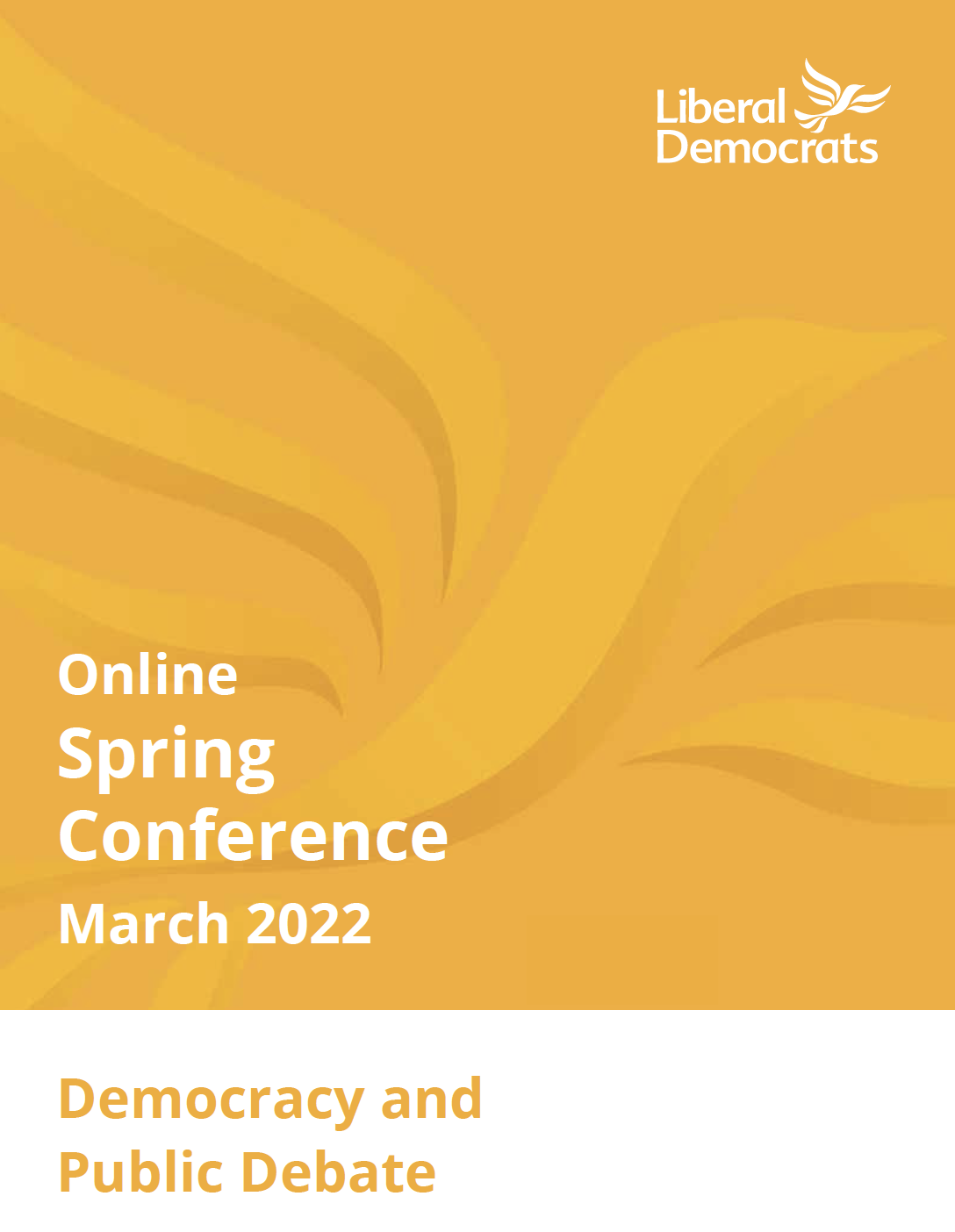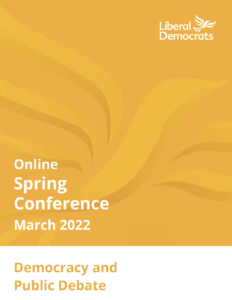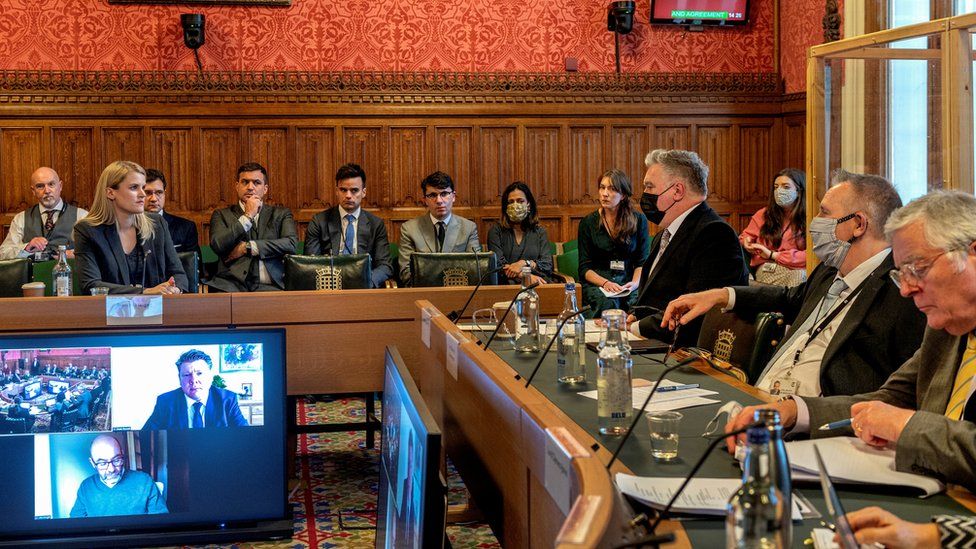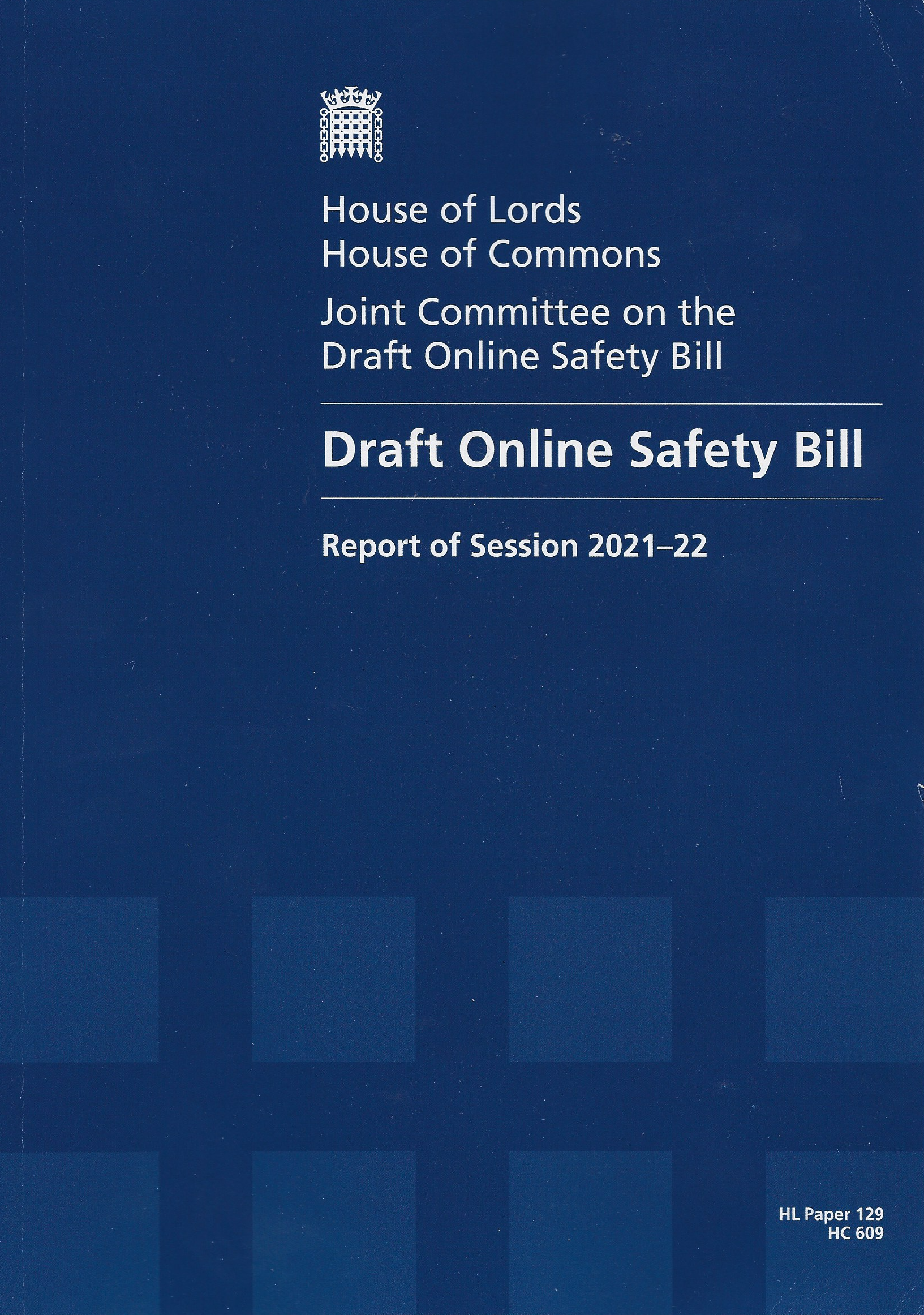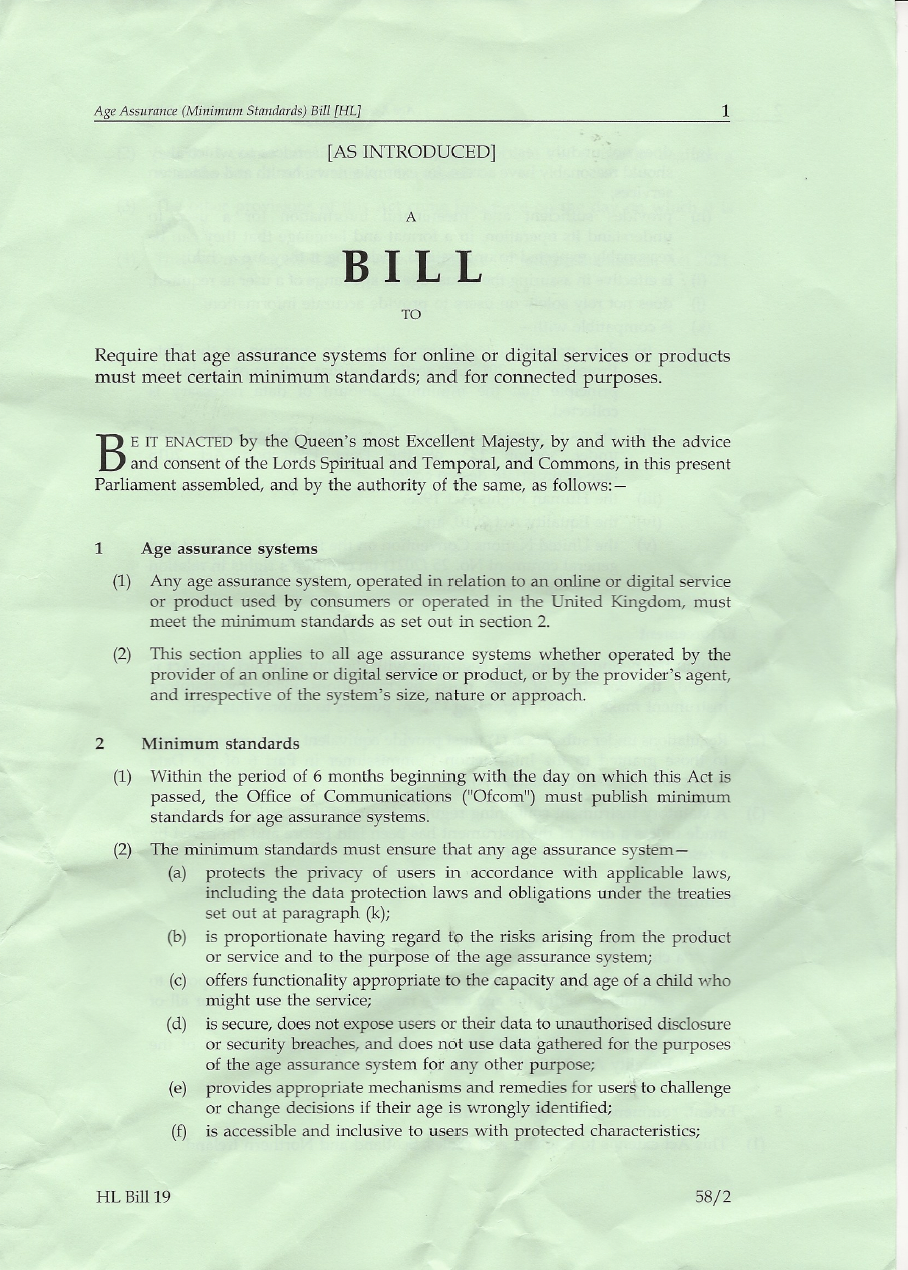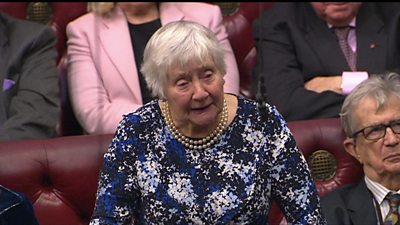Lib Dems back new policy on Democracy and Public Debate
At our recent conference the Party backed a new policy paper on Democracy and Public Debate.
This is what I said in support
Conference, As we saw from the debate last Autumn, policy on public debate and free speech is a difficult one to get right, particularly online. We have to make sure as a party that we find the proper balance between the right not to experience harm online and the right to freedom of expression.
I admit that none of us are going to agree with every single word of a policy document when the digital world is moving so fast but this is a good motion and we need to make decisions.
I spent 6 months of last year on the Joint Scrutiny Committee looking in detail at the Government’s flawed proposals for the regulation of online harms in the draft Online Safety Bill. We heard evidence from a great number of witnesses about the grievous harms such as revenge porn, cyberflashing, trolling, encouragement to suicide and racism, being experienced online, in particular by children, and those with protected characteristics.
We also heard about the potentially dangerous impact of online platforms on our democracy in the way their algorithms and business models target messages- often extreme-using our own behavioural data.
Frances Haugen-the brave former Facebook now Meta employee in particular gave us a vital insight into the threats to our democracy from online mis and dis-information and the platforms’ failure to take adequate action.
The January 6th Riot at the Capitol in Washington was fuelled by Social Media. We now know the reality of Russian interference in Presidential elections and the Brexit Referendum via opaque social media accounts.
People should have the same rights online as they have offline and we must also recognize the unique dangers that online access sometimes poses.
The Online Safety Bill is due to be published this coming week. The Elections Bill is going through Parliament. We have new digital competition law coming down the track. If we pass this motion today it will give us a distinctive Liberal Democrat approach that we can be proud of.
Our Digital Bill of Rights will set out the principles of the approach. In particular : the right to free expression and participation online without being subject to harassment and abuse which should underpin our Party and Society.
We must regulate so we ensure platforms comply with these principles, are audited for their policies and processes in terms of treatment of users and dissemination of illegal content monitored on how they respond to infringement and sanctioned for failure, with the Communications Court as a backstop.
Media and digital literacy too, so strongly emphasized by the Democracy and Public Debate paper, is vital too. We need, as it says, to combat misinformation with critical thinking.
Conference this motion combines principles, regulation and education in the right proportion. Please back it overwhelmingly.
To Save Democracy We Must Tackle Dis- and Misinformation Online
Recently the House of Lords debated the Report "Digital Technology and the Resurrection of Trust" produced by the Democracy and Digital Technologies Select Committee chaired by Lord David Puttnam, now sadly retired from the House of Lords
This is an edited version of the speech I gave winding up the debate
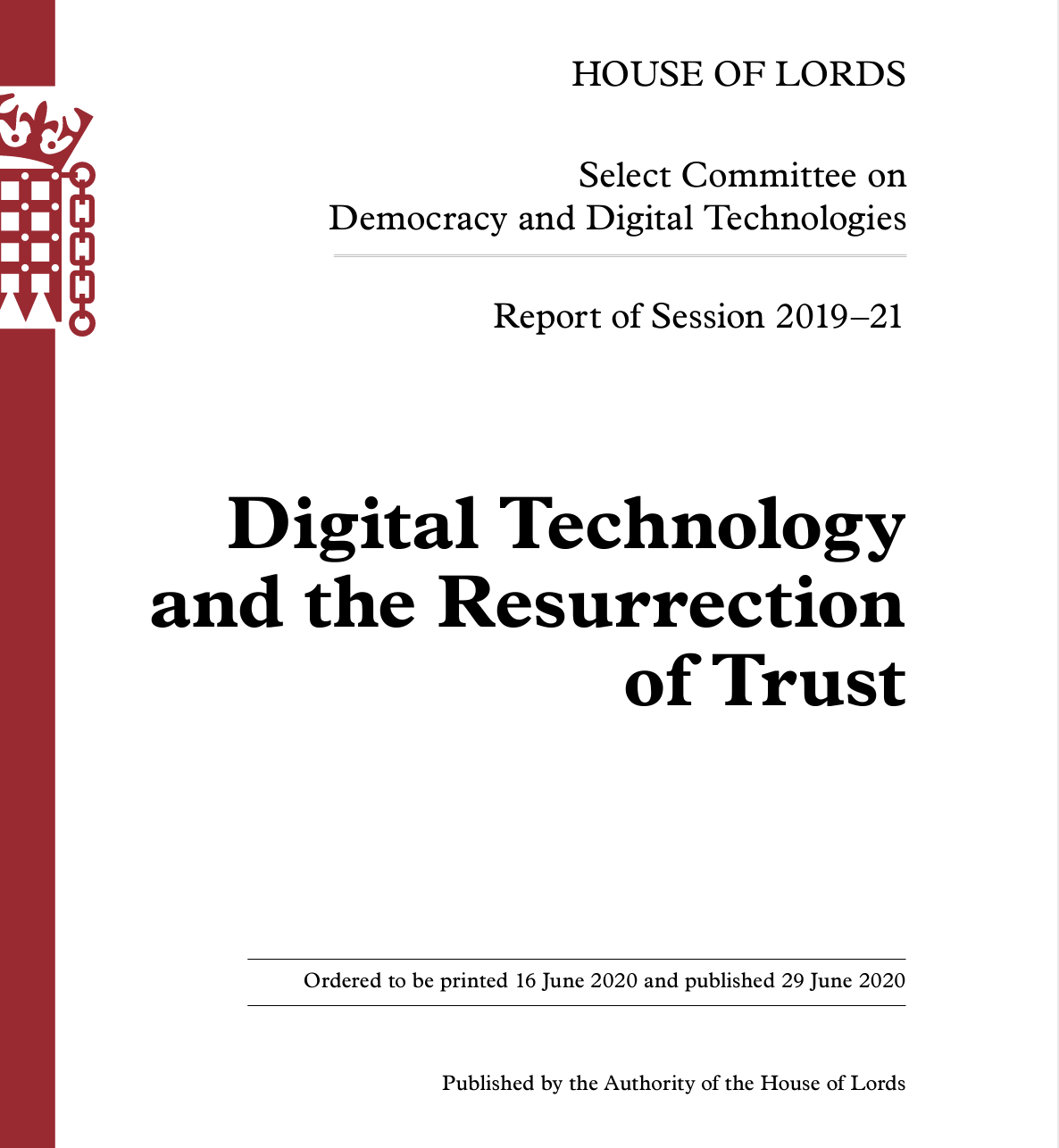
My Lords, this has been an inspiring debate. Events in Ukraine should make us all cherish our democracy in Britain and reinforce our determination to reinforce democratic values across the world. Nothing can compare with the suffering of the Ukrainian people in the defence of their democracy: they are a shining example to us all.
It is regrettable that we are debating this excellent report, which is still highly topical, nearly two years after it was published. I, like all of us who have spoken in this debate, very much miss Lord Puttnam leading the charge on the issues so important to him, and with which his valedictory lecture last October dealt so brilliantly. We also owe a big debt of gratitude to the noble Lord, Lord Lipsey, for stepping in and for his masterful introduction. It is good to see so many members of the committee participating today.
As the noble Lord, Lord Lipsey, says, what seemed controversial then has become commonplace today. Some of the recommendations of the committee are already in the pipeline, but we need to give far more attention to the other recommendations that are not in the pipeline. Given the crossover with many aspects of the report of the Joint Committee on the Draft Online Safety Bill, I am particularly pleased to be taking part in this debate today.
In a piecemfour years ago, US tech journalist Dylan Matthews wrote:
“The internet was supposed to save democracy… How could we have gotten this so wrong?”
He wrote this in the light of allegedmanipulation by Russia both in the US presidential elections and in the Brexit vote, with the aid of Cambridge Analytica, which used data collected online from millions of personal Facebook accounts, targeting individuals with specific misinformation. As the noble Baroness, Lady Morris, said, we were too slow to see the risks. As the noble Lord, Lord Stevenson, said, who doubts this activity now?
In the intervening years, the power of viral disinformation on social media has become even clearer. The long-delayed report on Russian interference, by the Intelligence and Security Committee in July 2020, said:
“The UK is clearly a target for Russia’s disinformation campaigns and political influence operations and must therefore equip itself to counter such efforts.”
We also had the riots at the Capitol in Washington DC on 6 January 2021, mentioned by the noble Lord, Lord Harris. An investigation by ProPublica and the Washington Post found that Facebook groups swelled —with at least 650,000 posts attacking the legitimacy of Joe Biden’s victory—between election day and the 6 January riot, with many calling for executions or other political violence.
We have had former Facebook—now Meta—employee Frances Haugen’s damning testimony, mentioned by the noble Baroness, Lady Kidron, and the noble Lord, Lord Mitchell, to the USA Senate and our own Joint Committee on the Draft Online Safety Bill, on which I sat. She accused the company of putting
“astronomical profits before people.”
Most of us need little convincing that things have gone badly wrong somewhere, and in 2022, after Covid lockdown, the situation seems worse. But as the report of the Democracy and Digital Technologies Committee says, we must look at the roots of the problem and the accountabilities involved. It is all about the power of the algorithm and data, as the noble Lords, Lord Stevenson and Lord Mitchell, said.
We are being targeted with our own data. Online political microtargeting is used to alter how we vote, especially with misinformation. xtreme content is amplified as part of the platform business model. Outrage is encouraged. Their business models operate directly against the best interests of a democratic society. They prey on us, in that vivid phrase quoted by the noble Baroness, Lady Kidron. Lord Puttnam made the strong point in his valedictory lecture that 6 January was a wake-up call to tackling the problems with microtargeting and algorithm bias which underlie the business models of the social media platforms.
Ownership of data is increasingly concentrated in the hands of big internet brands, as we have heard from a number of noble Lords today. Metcalfe’s law of networks has led to enormous and growing power for social media.
What should the consequences be for social media? How can we prevent these harms to democracy? How can we restore trust—or resurrect it, in the words of the report? The bottom line is that we do have the power, as the noble Lords, Lord Holmes and Lord Stevenson, said. We need government regulation, and quickly. In the phrase used by Avaaz, we need to detoxify the algorithm, not only regarding hate speech, terrorism and cyberbullying but in very clear electoral regulation and action by the Competition and Markets Authority to enforce competition in the tech and data space.
We also need much greater personal control over our data and how it is used. Misinformation and disinformation are particularly hard to define, but as the committee said, if the Government decide that the Online Safety Bill is not the appropriate place to do so, then it should use the Elections Bill, which is currently making its way through Parliament. Tackling societal harms caused by misinformation and disinformation is not straightforward, as our Joint Committee found, but the draft online safety Bill, as we described in our report of last December, needs to go further.
There is of course a tension with freedom of expression and as we emphasised, we must prioritise tackling specific harmful activity over restricting content.
In our Joint Committee report, we recommended safety by design requirements, such as increasing transparency and countering algorithmic power and virality; as Fair Vote says, it is a proven way to preserve free speech, while limiting free reach of content that poses societal harm at scale. For example, we heard that a simple change—introducing more friction into sharing on Facebook—would have the same effect on the spread of misinformation and disinformation as the entire third-party fact checking system.
We do not yet know what the Government’s response to these recommendations is—that may come next week—but we do have the Elections Bill in front of us. The real government reluctance is in reform of electoral law and regulation of digital political activity. Apart from the digital imprint provisions, the Bill fails to take any account of the mounting evidence and concerns about the impact on our democracy of misinformation and disinformation. The Government are yet even to adopt the Electoral Commission report of June 2018, Digital Campaigning: Increasing Transparency for Voters, which called for urgent reforms to electoral law to combat misinformation, misuse of personal data and overseas interference in elections amid concerns that British democracy may be under threat. Why are these recommendations not contained in the Elections Bill? We heard in the previous debate today about the flaws in that Bill
How prescient was the ISC in its Russia report:
“The links of the Russian elite to the UK – especially where this involves business and investment – provide access to UK companies and political figures, and thereby a means for broad Russian influence in the UK. To a certain extent, this cannot be untangled and the priority now must be to mitigate the risk and ensure that, where hostile activity is uncovered, the tools exist to tackle it at source.”
Most recently, the Committee on Standards in Public Life has made a number of other important recommendations regarding digital and social media campaigning.
But, as have heard today, this is not enough. Regulation by itself will not deal with all the issues. Even though we are facing issues that threaten democracy, we should be trying to preserve the good that the internet has done as we work to mitigate itsharm to our political system. So, as well as regulation, there needs as be—as the Democracy and Digital Technologies Committee report says—public engagement to support digital understanding at all levels of society. As several noble Lords said, digital literacy and digital skills are of huge importance, as also emphasised by the Committee’s report. We must do more than simply expect Ofcom—even under the chairmanship of the noble Lord, Lord Vaizey—to deliver a digital media strategy. This needs a whole-of-government and whole-of-society approach. We are supposed to be the cradle of democracy, yet the EU is way ahead of us in its proposals to regulate political advertising. This needs cross-governmental action and much greater action from social media platforms themselves.
At the end of the day, however,we need to look in the mirror. We deserve a better system. The Government are playing into the hands of those who wish to erode our democracy by digital means. Why are they intent on reducing the independence of the Electoral Commission? As the noble Lord, Lord Griffiths, said, trust in our democracy has been eroded by this Government—certainly by the negative response so graphically described by the noble Lord, Lord Mitchell. The Government must change tack and provide effective safeguards.
The Road to Trustworthy Use of Healthcare Data: Good Governance and a Sovereign Health Fund
I recently did a Guest blog for Future Care Capital on Data in the Health and Care Bill

https://futurecarecapital.org.uk/latest/guest-blog-lord-clement-jones-3/
The Health and Social Care Bill currently passing through Parliament potentially contains major changes to the way that our public health data will be treated with the merging of NHS Digital and NHSX with NHS England. Important amendments are needed.
All of us recognize the benefits of using health data which arises in the course of treating patients in the NHS for research that will lead to new and improved treatments for disease and for the purposes of public health and health services planning. It has in particular been of great benefit in helping to improve the treatment of COVID during the pandemic.
The introduction of Shared Care Records is a key part of this revolution. These allow staff involved in a person’s care, to access health and care records to provide better joined-up care across different parts of the health and social care system.
But increasingly the Government and, I am sad to say, agencies such as NHS Digital and NHSX seem to think that they can share patient data with private companies with barely a nod to patient consent and proper principles of data protection.
We can go back to December 2019 and the discovery by Privacy International that the Department of Health and Social Care had agreed to give free access to NHS England health data to Amazon allowing them to develop, advertise, and sell new products, applications, cloud-based services and/or distributed software.
Take the situation last year where we had what has been described as the biggest data grab in the history of the health service of GP patient data. In May, NHS Digital with minimal consultation, explanation or publicity and without publication of any data protection impact assessment (DPIA) published its plans to share patients’ primary health care data collected by GP practices giving patients just 6 weeks to opt-out.
As a result of campaigners’ efforts, including a group of Tower Hamlets GPs who refused to hand over patient data, Ministers first announced that implementation would be delayed until 1 September and then by letter to GP’s in July put the whole scheme on hold including data collection.
As a result of this bungled approach more than a million people have now opted out of NHS data-sharing.
The government have had to revise their approach and devise a simpler opt-out system and commit to the publication of a data impact assessment before data collection starts again. They have had to commit that access to GP data will only be via a Trusted Research Environment (TRE) and commit to properly thought through engagement and communications strategy.
But if we areto retain and build trust in the use of health data, we need a new governance framework.
The Government must gain society’s trust through honesty, transparency and rigorous safeguards. The individual must have the right to choose whether to share their data or not and understand how it will be used.
We need to retain NHS Digital’s statutory safe haven functions separate from NHS England and all health data must be held anonymously and accessed through an accredited data access environment, designed to cover not only the promised TRE but also where data is used for planning purposes.
The data held by the NHS must be considered as a unique source of value held for national benefit. Retaining control over our publicly generated data, particularly health data, for planning, research and innovation is vital if the UK is to maintain its position as a leading life science economy and innovator.
We need a guarantee that our health data will be used in an ethical manner, assigned its true value and used for the benefit of UK healthcare. Any proceeds from data collaborations that the Government agrees to, integral to any replacement or new trade deals, should be ring-fenced for reinvestment in the health and care system with a Sovereign Health Fund.
Those I believe are the right foundations for health data governance and, alongside other members of the Lords such Lord Hunt of Kings Heath and Baroness Cumberledge -both with enormous experience of the health service- I will be supporting and tabling amendments during the passage of the Bill to secure them.
Report of the Joint Committee on the Online Draft Bill: New offences and tighter rules
After 4 months work the Joint Select Committee on the Draft Online Safety Bill, with Damian Collins MP as our excellent Chair, has produced its report to generally favorable reviews
We have tried to ensure in our recommendations that the safety duties placed on Ofcom and the platforms are much clearer, by reference to existing and new, Law Commission recommended, offences and at the same time we do not infringe rights to freedom of expression. We have also recommended that paid for advertiing and online scams are included in regulated acctivity. We have recommended that it be made clear that all commercial pornography site be subject to the Age Appropriate Design Code aso that Age Assurance ensures that young people are are not subjected to unwanted online porn. We have also recommended that the role of Online Safety Ombudsman be established.
Here is the BBC summary
https://www.bbc.co.uk/news/technology-59638569
And here is the official parlimentary summary
https://ukparliament.shorthandstories.com/draft-online-safety-bill-joint-committee-report/index.html
The online world has revolutionised our lives
While the internet has created many benefits, underlying systems using data harvesting and microtargeted advertising have shaped the way we experience it.
Algorithms, invisible to the public, decide what we see, hear and experience. For some service providers, this means valuing the engagement of users at all costs, regardless of what holds their attention. This can result in amplifying the false over the true, the extreme over the considered, and the harmful over the benign.
The human cost of an unregulated internet can be counted in:
- mass murder in Myanmar
- intensive care beds full of unvaccinated covid-19 patients
- insurrection at the US Capitol
- teenagers sent down rabbit holes of content promoting self-harm, eating disorders and suicide.
The Online Safety Bill is a key step forward for democratic societies to bring accountability and responsibility to the internet.
We want the Bill to be easy to understand for service providers and the public alike. It should have clear objectives that lead into precise duties on the providers, with robust powers for the regulator to act when the platforms fail to meet those legal and regulatory requirements.
Online services should be held accountable for the design and operation of their systems and regulation should be governed by a democratic legislature and an independent Regulator—not Silicon Valley.
Four recommendations to strengthen the Bill
1. What's illegal offline should be regulated online
We agree that the criminal law should be the starting point for regulation of potentially harmful online activity, and that safety by design is critical to reduce its prevalence and reach.
A law aimed at online safety that does not require companies to act on, for example, misogynistic abuse or stirring up hatred against disabled people would not be credible. Leaving such abuse unregulated would itself be deeply damaging to freedom of speech online.
2. Ofcom should issue binding Codes of Practice
We recommend that Ofcom be required to issue a binding Code of Practice to assist providers in identifying, reporting on and acting on illegal content, in addition to those on terrorism and child sexual exploitation and abuse content.
As a public body, Ofcom's Code of Practice will need to comply with human rights legislation and this will provide an additional safeguard for freedom of expression in how providers fulfil this requirement.
3. New criminal offences are needed
We endorse the Law Commission's recommendations for new criminal offences in its reports.
The reports recommend the creation of new offences in relation to a number of harmful online activities.
We recommend that the Government bring in the Law Commission's proposed Communications and Hate Crime offences with the Online Safety Bill, if no faster legislative vehicle can be found. Specific concerns about the drafting of the offences can be addressed by Parliament during their passage.
4. Keep children safe from accessing pornography
All statutory requirements on user-to-user services, for both adults and children, should also apply to Internet Society Services likely to be accessed by children, as defined by the Age Appropriate Design Code. This would have many advantages.
In particular, it would ensure all pornographic websites would have to prevent children from accessing their content. Many such online services present a threat to children both by allowing them access and by hosting illegal videos of extreme content.
Ingredients for good higher education governance
I was recently asked by Advance HE to do a short piece reflecting on governance in the Higher Education Sector. It is reprinted in the Wilde Search publication Robust, Resilent and Ready: Assessing and Strengthening Governance in Charities and Education
https://www.advance-he.ac.uk/news-and-views/ingredients-good-higher-education-governance
https://www.wildsearch.org/pdf-robust-resilient-and-ready
Chairing a Higher Education institution is a continual learning process and it was useful to reflect on governance in the run up to Advance HE’s recent discussion session with myself and Jane Hamilton, Chair of Council of the University of Essex.
Governance needs to be fit for purpose in terms of setting and adhering to a strategy for sustainable growth with a clear set of key strategic objectives and doing it by reference to a set of core values. And I entirely agree with Jane that behaviour and culture which reflect those values are as important as governance processes.
But the context is much more difficult than when I chaired the School of Pharmacy from 2008 when HEFCE was the regulator. Or even when I chaired UCL’s audit committee from 2012. The OfS is a different animal altogether and despite the assurance of autonomy in the Higher Education Act, it feels a more highly regulated and more prescribed environment than ever.
I was a Company Secretary of a FTSE 100 company for many years so I have some standard of comparison with the corporate sector! Current university governance, I believe, in addition to the strategic aspect, has two crucial overarching challenges.
First, particularly in the face of what some have described as the culture war, there is the crucial importance of making, and being able to demonstrate, public contribution through – for example – showing that:
- We have widened access
- We are a crucial component of social mobility, diversity and inclusion and enabling life chances
- We provide value for money
- We provide not just an excellent student experience but social capital and a pathway to employment as well
- In relation to FE, we are complementary and not just the privileged sibling
- We are making a contribution to post-COVID recovery in many different ways, and contributed to the ‘COVID effort’ through our expertise and voluntary activity in particular
- We make a strong community contribution especially with our local schools
- Our partnerships in research and research output make a significant difference.
All this of course needs to be much broader than simply the metrics in the Research Excellence and Knowledge Exchange Frameworks or the National Student Survey.
The second important challenge is managing risk in respect of the many issues that are thrown at us for example
- Funding: Post pandemic funding, subject mix issues-arts funding in particular. The impact of overseas student recruitment dropping. National Security and Investment Act requirements reducing partnership opportunities. Loss of London weighting. Possible fee reduction following Augar Report recommendations
- The implications of action on climate change
- USS pension issues
- Student welfare issues such as mental health and digital exclusion
- Issues related to the Prevent programme
- Ethical Investment in general, Fossil Fuels in particular
- And, of course, freedom of speech issues brought to the fore by the recent Queen’s Speech.
This is not exhaustive as colleagues involved in higher education will testify! There is correspondingly a new emphasis on enhanced communication in both areas given what is at stake.
In a heavily regulated sector there is clearly a formal requirement for good governance in our institutions and processes and I think it’s true to say, without being complacent, that Covid lockdowns have tested these and shown that they are largely fit for purpose and able to respond in an agile way. We ourselves at Queen Mary, when going virtual, instituted a greater frequency of meetings and regular financial gateways to ensure the Council was fully on top of the changing risks. We will all, I know, want to take some of the innovations forward in new hybrid processes where they can be shown to contribute to engagement and inclusion.
But Covid has also demonstrated how important informal links are in terms of understanding perspectives and sharing ideas. Relationships are crucial and can’t be built and developed in formal meetings alone. This is particularly the case with student relations. Informal presentations by sabbaticals can reap great rewards in terms of insight and communication. More generally, it is clear that informal preparatory briefings for members can be of great benefit before key decisions are made in a formal meeting.
External members have a strong part to play in the expertise and perceptions they have, in the student employability agenda and the relationships they build within the academic community and harnessing these in constructive engagement is an essential part of informal governance.
So going forward what is and should be the state of university governance? There will clearly be the need for continued agility and there will be no let-up in the need to change and adapt to new challenges. KPI’s are an important governance discipline but we will need to review the relevance of KPIs at regular intervals. We will need to engage with an ever wider group of stakeholders, local, national and global. All of our ‘civic university’ credentials may need refreshing.
The culture will continue to be set by VCs to a large extent, but a frank and open “no surprises” approach can be promoted as part of the institution’s culture. VCs have become much more accountable than in the past. Fixed terms and 360 appraisals are increasingly the norm.
The student role in co-creation of courses and the educational experience is ever more crucial. The quality of that experience is core to the mission of HE institutions, so developing a creative approach to the rather anomalous separate responsibilities of senate and council is needed.
Diversity on the Council in every sense is fundamental so that there are different perspectives and constructive challenge to the leadership. 1-2-1s with all council members on a regular basis to gain feedback and talk about their contribution and aspirations are important. At Council meetings we need to hear from not just the VC, but the whole senior executive team and heads of school: distributed leadership is crucial.
Given these challenges, how do we attract the best council members? Should we pay external members? Committee chairs perhaps could receive attendance allowance type payments. But I would prefer it if members can be recruited who continue to want to serve out of a sense of mission.
This will very much depend on how the mission and values are shared and communicated. So we come back to strategic focus, and the central role of governance in delivering it!
Tim Clement-Jones
Lord C-J: Why We Should Support Baroness Kidron's Age Assurance Bill
I recently wound up a debate in the House of Lords on the Second Reading of Baroness Beeban Kidron's Age Assurance Private Member's Bill which is designed to set mandatory standards for age assurancace for internet sites and online platforms in the UK
Here is my speech explaining why I support this as an essential part of keeping children safe online.
My Lords, I add my thanks to those from all around the House to the noble Baroness, Lady Kidron, for introducing the Bill with such passion and commitment. We all know what an amazing campaigner she is. We hope that this is another stage in the end of—to adopt the powerful phrase of the noble Lord, Lord Cormack—the destruction of innocence.
It is a privilege to be winding up from these Benches, and to serve on the Joint Committee on the Draft Online Safety Bill along with the noble Baroness and the noble Lord, Lord Gilbert. Naturally, Members of the House have focused today on the importance of age assurance to child protection in terms of both safety and data protection. We should not tolerate the collateral damage from the online platforms—another powerful phrase, this time from the noble Baroness, Lady Kidron—as the cost of innovation.
A number of noble Lords, such as the noble Lord, Lord Russell, talked about cyberbullying, while the noble Baroness, Lady Bull, talked about the impact on body image and mental health in consequence. All around the House there are different motives for wanting to see proper standards for age assurance. I very much share what the noble Baroness, Lady Boycott, had to say about access to pornography having such a pernicious impact on young people’s relationships. At the same time, it was worth celebrating the genesis of Spare Rib. The word “empowerment” sprang to mind, because that underlies quite a lot of what we are trying to do today.
From my point of view, I cannot do better than quote the evidence from Barnardo’s to our Joint Select Committee to explain the frustration about what has been a long, winding and ultimately futile road over Part 3 of the Digital Economy Act, for which we waited for two years only to be told in 2019 that it was not going to be implemented. As Barnardo’s says:
“The failure to enact the original age verification legislation over three years ago has meant that thousands of children have continued to easily access pornography sites and this will continue unless the draft legislation is amended. Evidence shows (detailed later in the response) that accessing harmful pornography has a hugely damaging impact on children.”
As the noble Lord, Lord Lipsey, says, there should not be a second’s argument about restricting this. The evidence from Barnardo’s continues:
“The British Board of Film Classification survey in 2019 reported that children are stumbling upon pornography online from as young as seven. The survey also suggested that three-quarters of parents felt their child would not have seen porn online but more than half had done so.”
The noble Baroness, Lady Finlay, talked about a jungle of predators. The noble Lord, Lord Russell, even spoke of a pyramid of dung, which is an expression that was new to me today. The message from the noble Lord, Lord Gilbert, is clear: we need to be vigilant. It is astonishing that the online safety Bill itself does not tackle this issue. The noble Baroness, Lady Greenfield, put the whole impact of digital technology and social media on the brains of young people into perspective for many of us.
However, the crucial aspect is that the Bill is not about the circumstances in which age assurance or age verification is required but about the standards that must be adhered to. As the noble Baroness, Lady Kidron, said, we are talking about secure and privacy-protecting age assurance, proportionate to risk and with a route to redress. This is further testimony, from the NSPCC evidence to the Joint Select Committee:
“Given the intrinsic role of age assurance to deliver a higher standard of protection for children, the Government should set out further detail about how it envisages age assurance being implemented. Further clarification is required about if and when it intends to set standards for age assurance technologies. While the ICO intends to publish further guidance on age assurance measures later this year, it remains highly unclear what standards and thresholds are likely to apply.”
The process of setting standards started with the BBFC in preparing for the coming into effect of Part 3 of the Digital Economy Act. As the designated age-verification regulator, the BBFC published guidance on the kind of age-verification arrangements that would have ensured that pornographic services complied with the law. It rightly opted for a principles-based approach, as indeed does the Bill, rather than specifying a finite number of approved solutions, in order to allow for and encourage technological innovation within the age-verification industry. Sadly, that guidance was not implemented when the Government decided not to implement Part 3 of the DEA. As I say, this Bill adopts a similarly non-technology-prescriptive approach.
It is clearer than ever that, across a variety of news cases, we need a binding set of age-assurance standards. Again, I was taken by another phrase used by the noble Lord, Lord Gilbert: we need to create a positive place online. The noble Baroness, Lady Bull, talked about the digital world that children deserve. Why have the platforms not instituted proper age assessment already, as the noble Baroness, Lady Kennedy, asked? This should have been fixed a long time ago. As the noble Baroness, Lady Harding says, it is a multibillion-pound industry and, as the noble Lord, Lord Gilbert, said, they already know a huge amount about us. As the noble Baroness, Lady Finlay, said, the responsibility lies with the platforms, not young people, who are prone to addiction technology.
We can and should incorporate the requirements of the Bill into the online safety Bill, but we have an urgent need to make sure that these age-assurance standards are clear much earlier than that. The ICO set out in its guidance in October, Age Assurance for the Children’s Code—previously the age-appropriate design code—expectations for age-assurance data protection compliance. Ofcom’s Video-sharing Platform Guidance: Guidance for Providers on Measures to Protect Users from Harmful Material, also published in October, is even weaker. There is not even an expectation; it simply says:
“VSP providers may consider the following factors when establishing and operating age assurance systems”.
That is all they are, considerations and expectations. At present there are no sanctions attached to those requirements. It is clear that we need binding standards for age assurance to make these sets of guidance fully operative and legally enforceable.
The technology is there. The Government should adopt the Bill here and now—and ensure its passage before the end of this term. As the noble Baroness, Lady Harding, says, it lies in our hands. I hope noble Lords will resist the temptation to table amendments during the passage of the Bill. If they do resist that, we could avoid Committee stage and move rapidly towards Report and Third Reading, to make this Bill a reality.
As the right reverend Prelate said, children are at risk for the want of this Bill and we have the regulator in the wings.
As the noble Baroness, Lady Kidron, said, we could simply include this in the online safety Bill, but an 11 year-old will be an adult by 2024. As she asked, how many children will be harmed in the interim? The noble Lord, Lord Griffiths of Burry Port, said that watertight protection means mandatory standards for age assurance. This is a vital brick in the wall. The noble Lord, Lord Lipsey, said that he had heard every excuse from government for not implementing legislation—I think I am with him on that—and also said that this Bill is absolute proof against that. Let us give it the fairest wind we possibly can.
Lord C-J: ‘Byzantine’ to ‘inclusive’: status update on UK digital ID
From Biometricupdate.com
https://www.biometricupdate.com/202108/byzantine-to-inclusive-status-update-on-uk-digital-id
The good, the bad and the puzzling elements of the UK’s digital ID project and landscape were discussed by a group of stakeholders who found the situation frustrating at present, but believe recent developments offer hope for a ‘healthy ecosystem’ of private digital identity providers and parity between physical and digital credentials. Speakers also compared UK proposals with schemes emerging elsewhere, praising the EU digital wallet approach.
The panel was convened by techUK, a trade association focusing on the potential of digital technologies, against a backdrop of recent announcements by the UK’s Department for Digital, Culture, Media and Sport such as the ‘Digital identity and attributes consultation’ into the ongoing framework underpinning the move to digital, along with the slow-moving legislation on the digital economy.
“We seem to be devising some Byzantine pyramid of governance,” said Lord Tim Clement-Jones, House of Lords Spokesperson for Digital for the Liberal Democrats of the overall UK plan for digital ID on the multiple oversight and auditing bodies proposed. And that looking at the ‘Digital identity and attributes’ documentation “will blow your mind,” such is his feeling of frustration around the topic. He believes legislation on the Digital Economy Act 2017 Part 3 should have been passed long ago allowing providers such as Yoti to bring age verification solutions to the market.
Fellow panellist Julie Dawson, Director of Regulatory and Policy at Yoti was more optimistic about the current state of affairs. She noted the fact that 3.5 million people had used the UK’s EU Exit: ID Document Check app which included biometric verification to be highly encouraging as are the Home Office sandbox trials for digital age verification. However, the lack of a solid digital ID could put British people to a disadvantage, even in the UK, if they cannot verify themselves online such as in the hiring process. Yet people performing manual identity checks are expected to verify a driving license from another country, that they have never seen before, and make a decision on it – something she finds “theatrical.”
The panel, which also featured Laura Barrowcliff, Head of Strategy at digital identity provider GBG Plc was heavily skewed towards the private sector, including the chair, Margaret Moore, Director of Citizen & Devolved Government Services at French firm Sopra Steria which has recently been awarded a contract within France’s digital ID system. They agreed that the UK needs and is developing a healthy ecosystem of digital identity providers, that the ‘consumer’ should be at the heart of the system, that the private sector is an inherently necessary part of the future digital ID landscape.
The government’s role is to establish trust by setting the standards private firms must adhere to, believes Lord Clement-Jones and that it “should be opening up government services to third party digital ID”. He is opposed to the notion of a government-run digital ID system based on the outcome of the UK’s ineffective Verify scheme.
Lord Clement-Jones considers the current flow of evidence-gathering and consultations in the UK to be a “slow waltz”, particularly in light of the recent EU proposals for a digital wallet which is “exactly what is needed” as it is “leaving it to the digital marketplace”. He believes the lack of a “solid proposal” so far by the UK government is hampering the establishment of trust.
“The real thing we have to avoid is for social media to be the arbiters of digital ID. This is why we have to move fast,” said Clement-Jones, “I do not want to be defined by Google or Facebook or Instagram in terms of who I am. Let alone TikTok.” Which is why the UK needs digital commercial providers, noted the member of the House of Lords.
Yoti’s Julie Dawson believes the EU proposals could even see the bloc leapfrogging other jurisdictions with the provision for spanning the public and private sectors. The inclusion of ‘vouching’ in the UK system, where somebody without formal identity could turn to a known registered professional to vouch for them and allow them to register some form of digital ID was found to be highly encouraging. This could make the UK system more inclusive.
Data minimization should be a key part of the UK plan, where only the necessary attribute of somebody’s ID is checked, such as whether they are over 18, compared to handing over a passport or sending a scan which contains multiple other attributes which are not necessary for the seller to see. GBG’s Laura Barrowcliff said this is a highly significant benefit of digital ID and one which, if communicated to the public, could increase support for and trust in digital ID. Any reduction in fraud associated with the use of digital ID could also help sway public opinion, though multiple panellists noted that there will always be elements of identity fraud.
Yoti’s Dawson raised a concern that the current 18-month wait until any legislation comes from the framework and consultations could become lost time to developers and hopes they continue to enhance their offerings. She also called for further transparency in the discussions happening in government departments.
Lord Clement-Jones hopes for the formation of data foundations to manage publicly-held information so the public knows where data is held and how. GBG’s Laura Barrowcliff simply called for simplicity in the ongoing development of the digital ID landscape to keep consumers at the heart so that they can understand the changes and potential and buy into the scheme as their trust grows.
Digital ID: What’s the current state-of-play in the UK?
On 22 July, as part of the #DigitalID2021 event series, techUK hosted an insightful discussion exploring the current state-of-play for digital identity in the UK and how to build public trust in digital identity technologies. The panel also examined how the UK’s progress on digital ID compares with international counterparts and set out their top priorities to support the digital identity market and facilitate wider adoption.
The panel included:
- Lord Tim Clement-Jones, House of Lords Spokesperson for Digital for the Liberal Democrats
- Margaret Moore, Director of Citizen & Devolved Government Services, Sopra Steria (Chair)
- Julie Dawson, Director of Regulatory and Policy, Yoti
- Laura Barrowcliff, Head of Strategy, GBG Plc
You can watch the full webinar here or read our summary of the key insights below:
The UK’s progress on digital identity
Opening the session, the panel discussed progress around digital identity since the start of the pandemic.
Julie Dawson raised a number of developments that indicate steps in the right direction. Before the pandemic over 3.5m EU citizens proved their settled status via the EU Settlement Scheme, whilst the JMLSG and Land Registry have both since explicitly recognised digital identity, with digital right to work checks and a Home Office sandbox on age verification technologies in alcohol sales also introduced since March last year. She also lauded the creation of the Digital Regulation Cooperation Forum as a great example of joining up across government departments, such as on the topic of age assurance.
Lord Tim Clement-Jones on the other hand noted that the pace of change has remained slow. He said that the UK government needs to take concrete action and should focus on opening up government data to third party providers. He also made the point that the u-turn on the Digital Economy Act Part 3 has not as yet been rectified and so the manifesto pledge to protect children online has still to be fulfilled. Julie pointed out that legislative change in terms of the Mandatory Licensing Conditions are still needed, to enable a person to prove their age to purchase alcohol without solely requiring a physical document with a physical hologram.
Collaboration across industry around digital identities was also highlighted by Julie, drawing upon the example of the Good Health Pass Collaborative which has emerged since the start of the pandemic. The Collaborative has brought together a variety of stakeholders and over 130 companies to work on an interoperable digital identity solution to facilitate international travel post-COVID to operate at scale once more.
Examining the Government alpha Trust Framework and latest consultation
Moving on to look at the government’s alpha Trust Framework for digital identity, as well as the newly published consultation on digital identity and attributes, the panel explored what these documents do well and what gaps ultimately remain.
Julie Dawson and Laura Barrowcliff both saw a lot of good in the new proposals, with Laura highlighting how the priorities in the government’s approach around governance, inclusion and interoperability broadly hit on the right points. Julie also highlighted the role for vouching in the government’s framework as a positive step and emphasised the government’s recognition of the importance of parity for digital identity verification as one of the most central developments for wider adoption of the technology.
Providing a more cautious view, Lord Tim Clement-Jones said the UK risked creating a byzantine pyramid of governance on digital identity. He pointed to the huge number of bodies envisaged to have roles in the UK system and raised concerns that the UK will end up with a certification scheme that differs from anyone else’s internationally by not using existing standards or accreditation systems.
Looking forward, Julie highlighted that providers are looking for clarity on how to operate and deliver over the next 18 months before any of these documents become legislation. She also expressed the sincere hope that the progress made in terms of offering digital Right to Work checks, alongside physical ones, will continue rather than end in September 2021.
She identified two separate ‘tracks’ for public and private sector use of digital identity and raised the need for a conversation on when and how to join these up with the consumer at the heart. When considering data sources, for example, the ability of digital identity providers to access data across the Passport Office, the DVLA and other government agencies and departments is critical to support the development of digital identity solutions.
The panel was pleased to see the creation of a new government Digital Identity Strategy Board which they hoped would drive progress but raised the need for further transparency about ongoing work in this space, including a list of members, TOR and meeting minutes from these sessions.
Public trust in digital identity
One of the core topics of conversation centred upon trust in digital identity technologies and what steps can be taken to drive wider public trust in this space.
Lord Tim Clement-Jones said that there is a key role for government on standards to ensure digital identity providers are suitable and trustworthy, as well as in providing a workable and feasible proposal that inspires public confidence.
Julie highlighted how, alongside the Post Office, Yoti welcomed the soon to be published research undertaken by OIX into documents and inclusion.
Laura Barrowcliff emphasised the importance of context for public trust, putting the consumer experience at the heart of considerations. Opening up digital identity and consumer choice is one such way of improving the experience for users. Whilst much of the discussion on trust ties in with concerns around fraud, Laura highlighted how digital identity can actually help from a security and privacy perspective by embodying principles such as data minimisation and transparency. She also highlighted how data minimisation and proportionate use of digital identity data could be key for user buy-in.
Lessons from around the world
Looking to international counterparts, the panel drew attention to countries around the world which have made good progress on digital identity and key learnings from these global exemplars.
The progress on digital identity made in Singapore and Canada was mentioned by Julie Dawson, who emphasised the openness around digital identity proposals – which span the public and private sector – and the work being done to keep citizens informed and involve them in the process.
Julie also raised the example of the EU, which is accelerating its work on digital identity with an approach that also spans the public and private sector and is looking at key issues such as data sources whilst focusing on the consumer. Lord Tim Clement-Jones emphasised the importance of monitoring Europe’s progress in this area and the need for the UK government to consider how its own approach will be interoperable internationally.
Panellists discussed the role digital identities have played in Estonia where 99% of citizens hold digital ID and public trust in digital identities is the norm. However, they recognised key differences between the UK and Estonia. In the UK, digital identity solutions are developing in the context of widespread use of physical identification documents, whereas digital identities were the starting point in Estonia.
Beyond the EU, Laura said that GBG has a digital identity solution in Australia where the market for reusable identities is accelerating rapidly. She highlighted that working with private sector companies who have the necessary infrastructure and capabilities in place is critical to drive adoption.
Priorities for digital identity
Drawing the discussion to a close, each of the panellists were asked for their top priority to support public trust and the growth of the digital identity market in the UK.
Transparency was identified as Julie Dawson’s top priority, particularly around what discussions are happening within and across government departments and on the work of the Strategy Board.
Lord Tim-Clement Jones highlighted data and trustworthy data-sharing as key. He said he hopes to see the formation of data foundations and trusts of publicly held information that is properly curated to be used or shared on the basis of set standards and rules, which should spill over into the digital identity arena.
Laura Barrowcliff said simplicity is most important, keeping things simple for those working in the ecosystem as well as for consumers, with those consumers at the heart of all decision-making processes.
These are the ingredients for good higher education governance
I recently took part in a session on "Higher education governance - the challenges that lie ahead and what can we do about it " at an AdvanceHE Clerks and Secretaries Network Event and shared my view on university governance. This is the blog I wrote afterwards which reflects what I said.
https://www.advance-he.ac.uk/news-and-views/ingredients-good-higher-education-governance
Chairing a Higher Education institution is a continual learning process and it was useful to reflect on governance in the run up to Advance HE’s recent discussion session with myself and Jane Hamilton, Chair of Council of the University of Essex.
Governance needs to be fit for purpose in terms of setting and adhering to a strategy for sustainable growth with a clear set of key strategic objectives and doing it by reference to a set of core values. And I entirely agree with Jane that behaviour and culture which reflect those values are as important as governance processes.

But the context is much more difficult than when I chaired the School of Pharmacy from 2008 when HEFCE was the regulator. Or even when I chaired UCL’s audit committee from 2012. The OfS is a different animal altogether and despite the assurance of autonomy in the Higher Education Act, it feels a more highly regulated and more prescribed environment than ever.
I was a Company Secretary of a FTSE 100 company for many years so I have some standard of comparison with the corporate sector! Current university governance, I believe, in addition to the strategic aspect, has two crucial overarching challenges.
First, particularly in the face of what some have described as the culture war, there is the crucial importance of making, and being able to demonstrate, public contribution through – for example – showing that:
- We have widened access
- We are a crucial component of social mobility, diversity and inclusion and enabling life chances
- We provide value for money
- We provide not just an excellent student experience but social capital and a pathway to employment as well
- In relation to FE, we are complementary and not just the privileged sibling
- We are making a contribution to post-COVID recovery in many different ways, and contributed to the ‘COVID effort’ through our expertise and voluntary activity in particular
- We make a strong community contribution especially with our local schools
- Our partnerships in research and research output make a significant difference.
All this of course needs to be much broader than simply the metrics in the Research Excellence and Knowledge Exchange Frameworks or the National Student Survey.
The second important challenge is managing risk in respect of the many issues that are thrown at us for example
- Funding: Post pandemic funding, subject mix issues-arts funding in particular. The impact of overseas student recruitment dropping. National Security and Investment Act requirements reducing partnership opportunities. Loss of London weighting. Possible fee reduction following Augar Report recommendations
- The implications of action on climate change
- USS pension issues
- Student welfare issues such as mental health and digital exclusion
- Issues related to the Prevent programme
- Ethical Investment in general, Fossil Fuels in particular
- And, of course, freedom of speech issues brought to the fore by the recent Queen’s Speech.
This is not exhaustive as colleagues involved in higher education will testify! There is correspondingly a new emphasis on enhanced communication in both areas given what is at stake.
In a heavily regulated sector there is clearly a formal requirement for good governance in our institutions and processes and I think it’s true to say, without being complacent, that Covid lockdowns have tested these and shown that they are largely fit for purpose and able to respond in an agile way. We ourselves at Queen Mary, when going virtual, instituted a greater frequency of meetings and regular financial gateways to ensure the Council was fully on top of the changing risks. We will all, I know, want to take some of the innovations forward in new hybrid processes where they can be shown to contribute to engagement and inclusion.
But Covid has also demonstrated how important informal links are in terms of understanding perspectives and sharing ideas. Relationships are crucial and can’t be built and developed in formal meetings alone. This is particularly the case with student relations. Informal presentations by sabbaticals can reap great rewards in terms of insight and communication. More generally, it is clear that informal preparatory briefings for members can be of great benefit before key decisions are made in a formal meeting.
External members have a strong part to play in the expertise and perceptions they have, in the student employability agenda and the relationships they build within the academic community and harnessing these in constructive engagement is an essential part of informal governance.
So going forward what is and should be the state of university governance? There will clearly be the need for continued agility and there will be no let-up in the need to change and adapt to new challenges. KPI’s are an important governance discipline but we will need to review the relevance of KPIs at regular intervals. We will need to engage with an ever wider group of stakeholders, local, national and global. All of our ‘civic university’ credentials may need refreshing.
The culture will continue to be set by VCs to a large extent, but a frank and open “no surprises” approach can be promoted as part of the institution’s culture. VCs have become much more accountable than in the past. Fixed terms and 360 appraisals are increasingly the norm.
The student role in co-creation of courses and the educational experience is ever more crucial. The quality of that experience is core to the mission of HE institutions, so developing a creative approach to the rather anomalous separate responsibilities of senate and council is needed.
Diversity on the Council in every sense is fundamental so that there are different perspectives and constructive challenge to the leadership. 1-2-1s with all council members on a regular basis to gain feedback and talk about their contribution and aspirations are important. At Council meetings we need to hear from not just the VC, but the whole senior executive team and heads of school: distributed leadership is crucial.
Given these challenges, how do we attract the best council members? Should we pay external members? Committee chairs perhaps could receive attendance allowance type payments. But I would prefer it if members can be recruited who continue to want to serve out of a sense of mission.
This will very much depend on how the mission and values are shared and communicated. So we come back to strategic focus, and the central role of governance in delivering it!
Shirley Williams 1930-2021
So sad to lose Shirley Williams, such a warm, principled and inspiring political pioneer. The conscience of the Liberal Democrats


